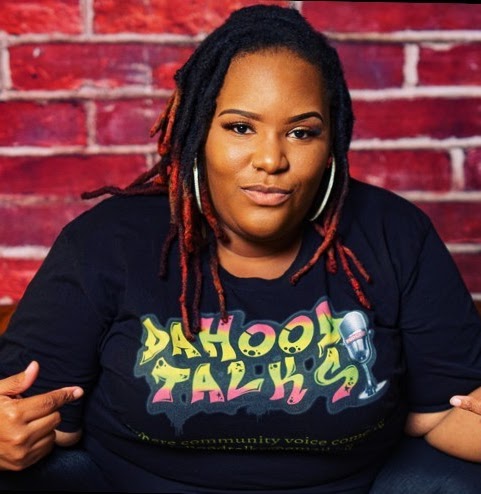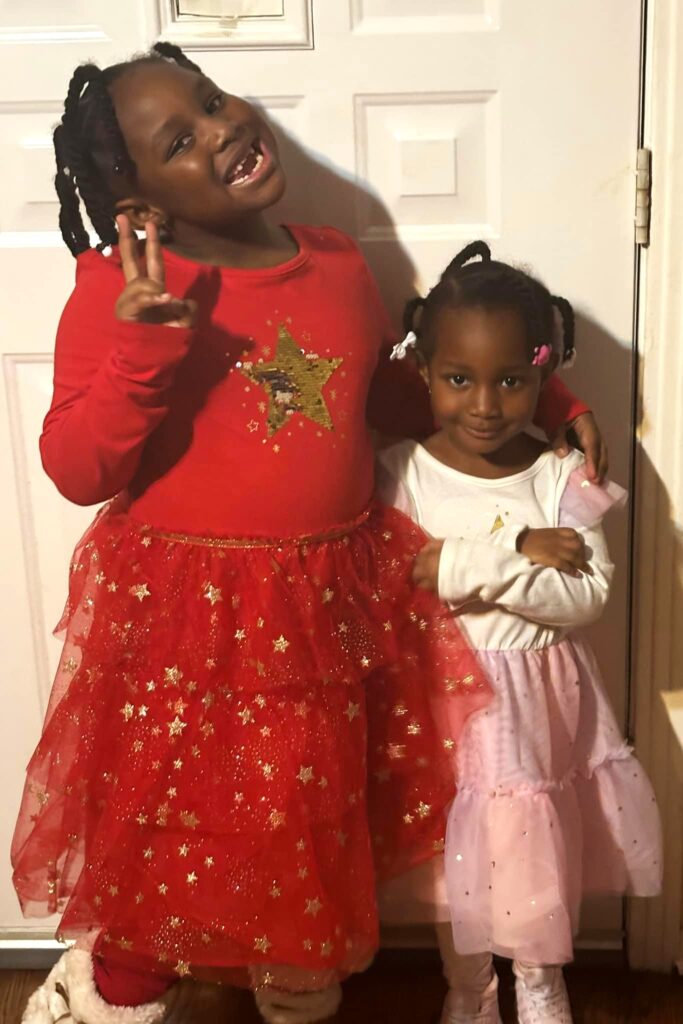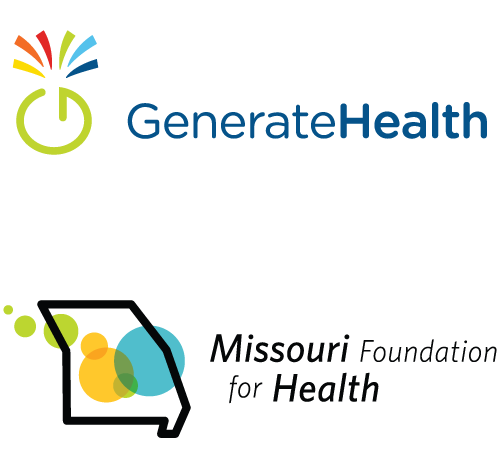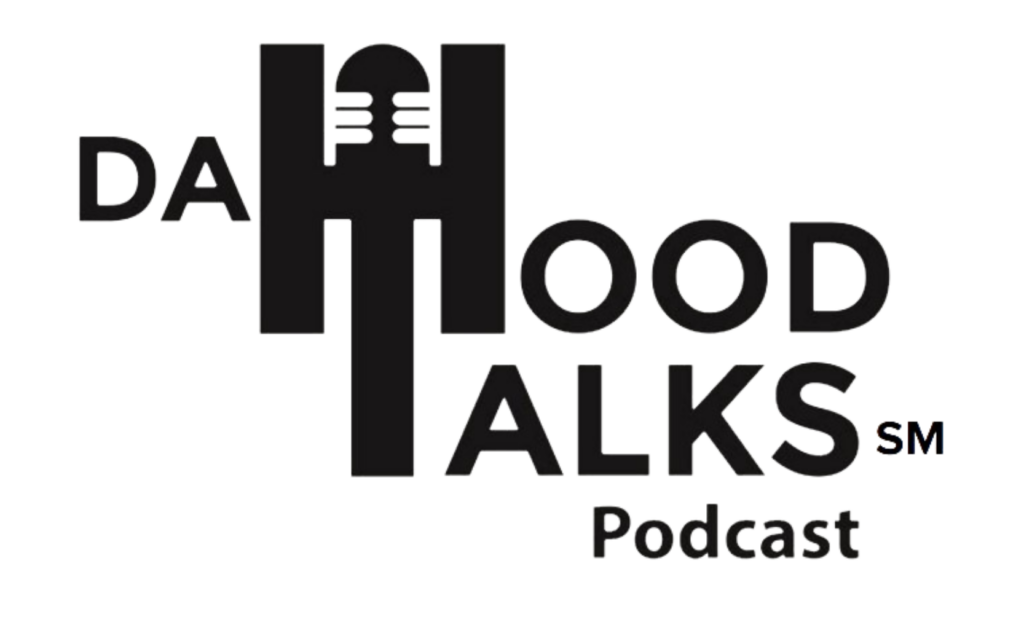
Ferguson resident Shavanna S. remembers being in school and working, trying to survive and not sure how to make an impact, she explains during the social uprising in 2014.
A decade later, Shavanna has created and co-hosts a podcast for the voiceless (Da Hood Talks) and a nonprofit organization to help community members navigate social systems (Da Hood Connect). She supports everyday people by lifting their voices; she is also now a mother of two.
A tale of two births
Shavanna had been with her partner for 6 years when she became pregnant. She says her doctor seemed to stop listening to her once she was pregnant and on Medicaid. When her first pregnancy resulted in a miscarriage, he blithely told her, “Oh, it’s normal. You’ll get pregnant again.” In that moment, she felt her experience had been minimized.
In 2018, Shavanna gave birth to her first daughter, Devaeh, which she says was a traumatic experience. She was given Pitocin to induce labor, which she suspects was to benefit the doctor’s schedule. She declined getting an epidural, but after 14 hours of labor, she relented. “I hated it,” she says, feeling everything was rushed and dealing with back pain long after Devaeh’s arrival the next morning.
Shavanna decided, “No more silence.” She took a doula class in 2019 and began speaking up about Black maternal health.

In 2019, while finding out she was pregnant with her daughter Delilah, she refused to do a magnetic resonance imaging (MRI) scan because of her blood clots and says the doctor told her she would die if she didn’t. “How do you say that to a client?” she asks. She got the MRI at the urging of her mother and aunties, and then suffered a blown vein when they injected the contrast agent. Shavanna says Black women will often trust a doctor’s word simply because of their title.
A nurse at that same hospital visit asked who the father was. Shavanna joked, “I don’t even know,” which was followed by the nurse lashing out about her choices. She asked to speak to a supervisor, she says, “because if you’re doing this to me, I’m sure you’re doing it to other women.”
In 2020, Shavanna had her second daughter, Delilah. This time she was more informed and had doulas to help her in the hospital and at home afterward. Because of her weight and gestational diabetes, the medical team consistently recommended she get an epidural, stay in bed for monitoring, and during labor offered to break her water. She refused and continued breathing exercises and walking as her doula had instructed. Her water broke naturally, and Delilah was born later that day.
Shavanna says doctors need to get out of this mindset every pregnant woman needs a medicinal intervention. “This is what we were built to do. Let us do it,” she says.
According to the U.S. Centers for Disease Control and Prevention, “Black women are three times more likely to die from a pregnancy-related cause than White women.” Shavanna asserts Black woman are dying during birth because the medical staff didn’t listen or performed unnecessary procedures. She says doulas are how we’re going to transform Black Maternal Health.
Birth of a leader

In 2019, Shavanna was invited to be part of the Community Leaders Cabinet (CLC) for Generate Health, a nonprofit focused on Black maternal health, and its FLOURISH initiative to identify racial equity barriers and solutions to reduce infant and maternal mortality. From 2019 to 2021, FLOURISH distributed $2.92 million in grants through the Missouri Foundation for Health.
Shavanna says Lora Gulley, Director of Community Mobilization at Generate Health, has been one of her biggest supporters and participating in the CLC put her in places she would never imagine. “They helped me find my voice,” she says.
Shavanna then joined Neighborhood Leadership Fellows (NLF), a leadership training program through University of Missouri-St. Louis Office of Research and Economic and Community Development for residents in the Promise Zone, a federal designation of neighborhoods in North St. Louis City and County in high need of development. She was pregnant with Delilah at the time, but virtual classes during the early months of the COVID-19 pandemic helped her attend every class.
Shavanna then attended the National Leadership Academy program at UMSL, a state-wide program to help community leaders build skills and plan a personal community project.
Shavanna was tired of the negativity in social media, especially the hateful comments, heightened by the protests of excessive force used by police after the deaths of George Floyd and Breonna Taylor. She wanted to talk about it in a way that could be impactful and create change.
Birth of a podcast

In Dec. 2020, she started Da Hood Talks podcast to uplift community voices and find ways to support urban communities. She asked other podcasters for advice and received a FLOURISH grant through Generate Health. She purchased equipment and created a studio/office in her basement. She also bought a T-shirt logo, advertising, and a laptop.
Shavanna gives a shout out to Lora Gulley at Generate Health, who helped her release Da Hood Talks on Zoom, allowing Shavanna to stay in her home with Devaeh and newborn Delilah. Shavanna says Lora has dedicated much of her time to the podcast.
In the beginning, Shavanna says, “I was just doing shows. I had no idea what I was doing.” The shows usually included a panel of speakers discussing any topic requested by community members.
Shavanna says funding is her greatest challenge. “I don’t want the community to have to pay for this thing,” she says. “The people I’m trying to reach are already struggling.” Shavanna sells Da Hood Talks t-shirts as one way to make money.
In its second season, Shavanna asked herself, “How do we get more solution-based? How do we not just talk, but we start uplifting and highlighting what resources are out there?”
Shavanna added a Da Hood Needs segment to showcase positive people and community organizations. She then added a Da Hood Heals segment to discuss mental health care with Black professionals, after hearing there was a need to hear from those Black professionals.
Community Member Storytelling segments, in which guests could come on and tell a story about their lives were also added. Shavanna gives her guests $50 for their time via gift card or Cash App. “Solutions can be small,” she says. One of her returning guests, who had been unhoused when she first told her story, said she and her son were now in a house in Kansas City and that $50 helped her in a time of great need.
New this year, in partnership with Generate Health, the Da Hood Talks in its fourth season has added in-person events with an audience. A bartender provides mocktail drinks at these events, because “It’s a vibe and it’s fun.” The drinks, food, and music are provided by Black-owned businesses. Shavanna also added a co-host, local comedian and doula, Shante Love.
Additionally, the podcast is a blueprint for my babies, Shavanna says, commenting on how Black women used to pass down their experiences to the next generation at social gatherings. “If something happens to me, I’ve left enough for my girls to know what their mama stood for and what their mama was doing.”
Shavanna says some people and organizations are hesitant to go into underserved communities to get answers. She suggests they listen to her podcast because the community is talking. She says, “those are the solutions you need to make happen.”
Birth of a nonprofit
In 2022, Shavanna created her nonprofit Da Hood Connect to help individuals navigate resources. She says there are plenty of organizations in St. Louis providing direct services, but she wanted to help guide individuals to those resources and find what’s best for them.
Shavanna knows first-hand how complex social support systems can be. She says, “We expect people to know everything and that’s just not how that works.” She says people can fall through the cracks because an organization lacks the capacity to care for all their needs.
People are focused on numbers, Shavanna says, but she wants quality over quantity. She wants people who come to her events to get more than basic services.
The community needs to come and feel good about being in that space.
Shavanna
At Da Hood Connect events, Shavanna asks others to help provide transportation or childcare. She remembers how the CLC provided meals and childcare, allowing her to stay focused. She knows this has a cost and requires coordination, but she says we need to invest in it more. “Those things are going to make it easy for community to show up,” she says, “especially people who need the resources.”